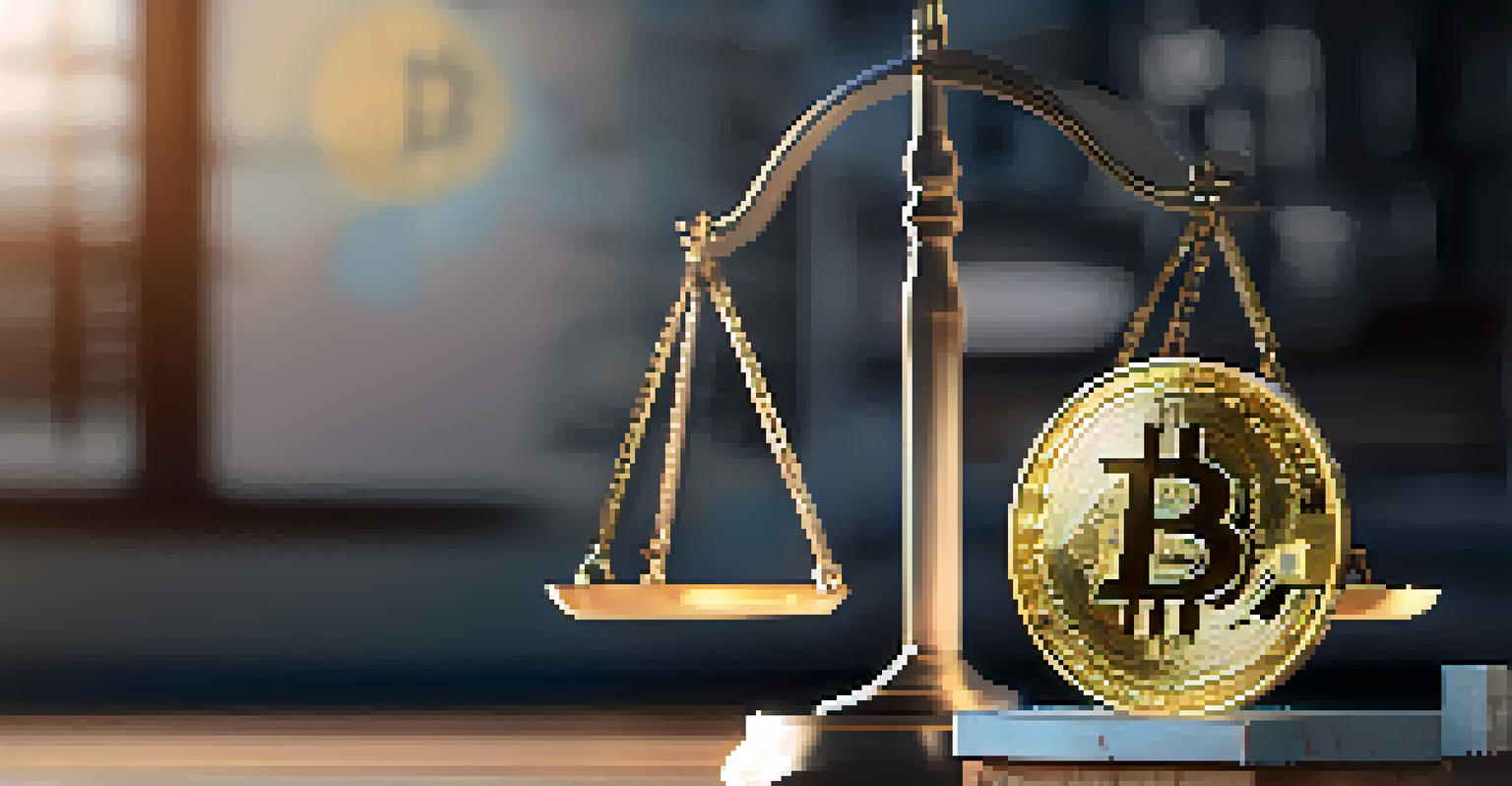Bitcoin vs Real Estate: A New Age Store of Value

Understanding Store of Value: The Basics
A store of value is an asset that maintains its value over time, allowing individuals to preserve purchasing power. Think of it like a piggy bank that holds wealth for future use, whether it's for buying a car or funding a vacation. Both Bitcoin and real estate have emerged as popular choices, but they function quite differently in how they retain value.
In investing, what is comfortable is rarely profitable.
Real estate has long been considered a reliable store of value due to its tangible nature and historical appreciation. When you buy a property, you own a physical asset that can provide shelter, rental income, or even a place to raise a family. In contrast, Bitcoin is a digital asset, relying on technology and market sentiment, which can make its value more volatile.
Understanding these foundational concepts helps clarify why many investors are weighing the benefits of Bitcoin against traditional assets like real estate. Both options have their merits, but the right choice depends on personal financial goals and risk tolerance.
Bitcoin: The Digital Gold of Our Time
Often referred to as 'digital gold,' Bitcoin offers unique advantages as a store of value. One of its most appealing traits is its limited supply; only 21 million Bitcoins will ever exist, which creates scarcity similar to that of precious metals. This scarcity can drive demand, potentially increasing its value over time.

Bitcoin's decentralized nature means that it's not controlled by any government or central authority, making it immune to inflationary policies. When traditional currencies lose purchasing power due to inflation, Bitcoin can serve as a hedge against these economic challenges. This characteristic attracts investors seeking alternative options to safeguard their assets.
Bitcoin vs. Real Estate as Value Stores
Both Bitcoin and real estate serve as stores of value but differ in volatility, stability, and personal financial goals.
However, Bitcoin's volatility can be a double-edged sword. While it can experience significant price increases, it can also suffer steep declines. This unpredictability can make it a risky choice for some, especially compared to the historically stable nature of real estate.
Real Estate: A Tangible Investment Option
Real estate is often seen as a more stable investment compared to Bitcoin. Owning property not only provides a sense of security but also offers potential income through rentals. Many investors appreciate having a tangible asset they can see and use, which adds to the appeal of real estate.
The stock market is filled with individuals who know the price of everything, but the value of nothing.
Moreover, real estate tends to appreciate over time, especially in desirable locations. While there are market fluctuations, the long-term trend usually favors increasing property values, making it a reliable store of wealth. This historical performance is reassuring for those looking for stability in their investment portfolio.
However, real estate does come with its own set of challenges, such as maintenance costs, property taxes, and market entry barriers like down payments. These factors can make it less accessible for some investors, especially when compared to the lower barriers to entry for purchasing Bitcoin.
Market Dynamics: Comparing Volatility and Stability
When comparing Bitcoin to real estate, understanding market dynamics is crucial. Bitcoin is known for its price volatility, with dramatic swings that can happen in a matter of hours. This can be exciting for traders but daunting for long-term investors who fear losing their investment overnight.
On the other hand, real estate markets tend to move at a slower pace, with fluctuations influenced by economic factors such as interest rates and local demand. This stability can be comforting, especially during economic downturns, which often result in housing prices remaining more resilient than cryptocurrencies.
Liquidity: Quick Access to Cash
Bitcoin offers high liquidity for quick transactions, while real estate transactions can be time-consuming.
Ultimately, the choice between these two stores of value may come down to an individual's risk tolerance. If you thrive on market excitement and can handle fluctuations, Bitcoin might be appealing. However, if you prefer a slower, steadier approach, real estate may suit you better.
Liquidity: Accessing Your Investment Quickly
Liquidity is another vital factor to consider when evaluating Bitcoin and real estate as stores of value. Bitcoin is highly liquid, meaning you can buy or sell it quickly on various exchanges, often within minutes. This quick access to cash can be a significant advantage, especially in urgent situations.
In contrast, real estate transactions can be time-consuming, often taking weeks or even months to close. Selling a property requires navigating numerous steps, including appraisals, inspections, and negotiations. This process can be a disadvantage if you need quick access to your funds.
The ease of liquidating Bitcoin can be appealing for those who value flexibility in their investments. However, the slower pace of real estate can be a comforting factor for others who prefer to hold onto their assets for the long term.
Diversification: Balancing Your Investment Portfolio
Diversifying investments is a key strategy for managing risk, and both Bitcoin and real estate can play unique roles in a balanced portfolio. By combining these two asset classes, investors can leverage the strengths of each while mitigating potential downsides. For example, while Bitcoin might provide high growth potential, real estate can offer stability and consistent income.
Investing in both assets can help cushion against market volatility. If Bitcoin experiences a downturn, real estate may hold steady or appreciate, providing a safety net. Conversely, if the housing market takes a hit, Bitcoin might soar, giving you a chance to offset losses.
Diversification Balances Risk
Combining Bitcoin and real estate in a portfolio can help mitigate risks and leverage the strengths of each asset.
Ultimately, the right mix of investments depends on your financial goals and risk tolerance. Whether you lean more towards Bitcoin’s potential for high rewards or real estate’s stability, a well-diversified portfolio can help you navigate the uncertainties of the market.
The Future of Value Storage: A Personal Choice
As we look to the future, the choice between Bitcoin and real estate as a store of value becomes increasingly personal. Each investor's situation varies based on financial goals, risk appetite, and market understanding. The rise of cryptocurrencies has prompted many to reassess traditional investment strategies, leading to a blending of asset classes.
Emerging technologies and changing economic landscapes will likely continue to influence how we perceive value storage. It’s possible that Bitcoin could become a more stable asset over time as it matures, while real estate will always remain a cornerstone of wealth for many. The key is to stay informed and adaptable as these markets evolve.

Ultimately, whether you choose Bitcoin, real estate, or a combination of both, the most important factor is finding what aligns with your financial vision. Your investment journey should reflect your values, goals, and willingness to embrace change in a rapidly evolving world.